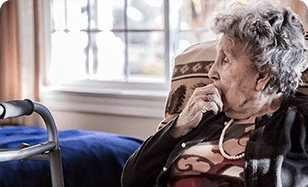Stage 2 Bedsores
A stage 2 bedsore, also known as a pressure sore or decubitus ulcer, is caused by low blood flow. At this stage, the sore has broken the skin, causing an open wound and pain. Nursing home residents are at risk of bedsores if they are not repositioned. While a stage 2 decubitus ulcer can typically heal in a matter of weeks, they are often a warning sign of nursing home abuse. Get a free case review now to see if you may be eligible for compensation.
Why Take Legal Action?
By filing a nursing home abuse lawsuit, you can seek financial compensation and justice from those who caused you or a loved one harm.
Results Secured
- $2.2 million for a Rhode Island resident who had a heart attack
- $2 million for the family of a California patient with dementia who passed away due to negligence
- $1.5 million for a woman in Minnesota with stage 4 bedsores
What Is a Stage 2 Bedsore?
A stage 2 bedsore is an open wound caused by pressure reducing blood flow at the site of the sore. If a stage 1 bedsore is not treated properly, it may progress into a stage 2 bedsore.
When this happens, the bedsore will break through the top layer of skin and look like an open blister. It typically causes pain.
Nursing home residents may be at risk of bedsores if they have limited mobility or underlying health problems.
When a stage 2 bedsore is left untreated, it can lead to serious nursing home injuries and even death.
Stage 2 Pressure Sore Causes
Bedsores and other pressure injuries develop when the blood supply is interrupted. Sitting or lying in the same position for too long restricts blood flow and damages the surrounding skin.
If a nursing home resident is left lying in the same position after a stage 1 bedsore has formed, the skin may tear open and cause a stage 2 pressure sore to form.
Improper nursing home care can also result in bedsores. For example, poor training or understaffing may prevent staff members from being able to address residents’ mobility needs.
Nursing home caregivers should be trained to detect stage 1 bedsores, note them in patients’ charts, and provide treatment to stop them from worsening.
If staff members fail to detect and care for a resident’s stage 2 bedsore in time, it can become untreatable and potentially lead to the patient’s wrongful death.
Who Is at Risk for a Bedsore Stage 2?
Nursing home residents who are bedbound or rely on staff members to help them move are at a higher risk of a stage 2 bedsore.
Other factors that can put seniors at risk of bedsores stage 2 include:
- Incontinence: Incontinence can make skin problems more likely as feces and urine may moisten nearby skin, increasing the risk of irritation. Further, adult diapers can trap waste, allowing them to damage skin unless they are quickly changed.
- Malnourishment: Poor nutrition reduces overall health and weight, two factors that make bedsores more likely. If someone is malnourished, they may take longer to heal from a stage 2 bedsore.
- Medical conditions: Elders with circulation issues like diabetes are more likely to suffer from bedsores.
Staff members are trained to prevent pressure ulcers, meaning that a stage 2 decubitus ulcer may be a sign of nursing home neglect.
If you or a loved one developed a bedsore in a nursing home, get a free case review right now to see if you may be eligible to take legal action.
Symptoms of a Stage 2 Decubitus Ulcer
The most notable symptom of a stage 2 decubitus ulcer is an open wound that has broken the top layer of skin called the epidermis. A stage 2 bedsore may also reach the dermis, which is the layer of skin below the epidermis.
Symptoms of a stage 2 bedsore may include:
- Blister (intact or ruptured)
- Clear fluid or pus
- Discolored or red skin
- Irritated skin
- Pain
Patients with stage 2 bedsores may complain of significant pain — much more than that experienced with stage 1 bedsores. The pain may lessen as the sore worsens, but it will become harder to treat and may lead to serious health complications.
A stage 2 decubitus ulcer can develop anywhere. However, areas close to bones are at greater risk, like around the hips, shoulder blades, and tailbone.
Preventing a Stage 2 Decubitus Ulcer
A stage 2 decubitus ulcer can be prevented if it is treated when it is a stage 1 pressure ulcer. This involves removing the pressure that caused the injury, cleaning the sore and drying it, and seeking medical care if it doesn’t clear up in 2-3 days.
Family members or loved ones can look for stage 1 bedsores — marked by discolored, painful patches of skin — when visiting a loved one in a nursing home. Nursing home residents can also prevent a stage 2 bedsore by noting signs or symptoms of a stage 1 bedsore and voicing their concerns to caregivers.
If a resident believes that staff members aren’t listening to their worries, they can talk to a trusted family member or long-term care ombudsman. The family may be able to intervene on the resident’s behalf, and ombudsmen are trained to resolve issues between nursing home staff and residents.
Stage 2 Bedsore Treatment
If a nursing home resident is suffering from a stage 2 bedsore, staff members should ensure that they see a health care provider as soon as possible.
The steps for how to treat stage 2 bedsores include:
- Bandaging: A bandage will help keep a stage 2 bedsore dry and reduce the risk of infection.
- Cleaning: Doctors may use a saltwater solution called saline to clean the open wound.
- Debriding: Damaged and dead tissue must be removed so the bedsore can heal properly. This process is known as debridement.
- Getting good nutrition: A diet rich in vitamins A and C, protein, zinc, and iron should be incorporated as part of a stage 2 bedsore treatment plan. Drinking enough water is also essential to promote healing.
- Reducing pressure: Taking pressure off a stage 2 decubitus ulcer will prevent it from getting worse and allow the skin to start repairing itself.
With proper medical care, a stage 2 bedsore will usually heal within 3 weeks.
A patient with a bedsore at this stage has a relatively good prognosis (health outlook) if they receive the right treatments in time.
Complications From a Stage 2 Decubitus Ulcer
If left untreated, a stage 2 decubitus ulcer can spread into deeper tissues, causing stage 3 ulcers and eventually stage 4 ulcers. Late-stage pressure sores are harder to treat and can cause serious health problems, some of which can be fatal.
Complications linked to a stage 2 decubitus ulcer include:
- Infection: A bedsore that becomes infected can cause fever, weakness, mental fog, and rapid heartbeat. Infections can also spread to the blood and bones, leading to conditions like sepsis and osteomyelitis.
- Permanent tissue damage: Some bedsores that affect deep tissue may never fully heal — even with treatment.
- Other health problems: Bedsores increase the risk of urinary tract infections (UTIs), amputations, and autonomic dysreflexia, a condition that can be fatal.
A stage 2 bedsore may also cause financial hardship, as the resident may need expensive medical treatment to recover fully and a safer home where they can get the care they deserve.
Legal Help for Nursing Home Neglect
Nursing home staff should be trained to detect a stage 1 bedsore and take action to prevent it from becoming a stage 2 bedsore. When they fail to do so, it may be considered nursing home neglect.
Filing a nursing home abuse legal claim may help you secure compensation to get your loved one quality care and hold the negligent nursing home accountable for the harm they’ve caused.
The nursing home abuse attorneys that LawFirm.com works with have recovered over $273 million for victims nationwide.
Our legal partners can help families in all 50 states, and they never charge any upfront or hourly fees.
Call our team at (888) 726-9160 right now or fill out our contact form to see if they can help your family.
Stage 2 Decubitus Ulcer FAQs
What does a stage 2 bedsore look like?
A stage 2 bedsore may look like a scrape, a blister, or a shallow crater in the skin. The skin around the wound may be discolored, and the sore may contain clear or yellow fluid.
A stage 2 bedsore may be a sign of nursing home abuse, as a stage 1 bedsore should be treated before it advances.
Get a free case review right now to learn about your legal options if you suspect a loved one may be experiencing nursing home abuse.
What is the life expectancy of a stage 2 bed sore?
Most patients with a stage 2 bed sore make full recoveries in less than a month. However, when bedsores are not properly treated, they can lead to life-threatening infections and other serious health problems.
How long does a stage 2 bedsore take to heal?
It takes anywhere from 3 days to about 3 weeks for a stage 2 pressure sore to heal once proper wound care has been administered. The amount of time may be affected by the size of the sore, its location on the body, and other factors.
How do you treat grade 2 bedsores?
To treat a stage 2 pressure sore, clean the affected area with mild soap and rinse with saline (sterile salt water). Next, dress the wound with a special bandage to promote healing and reduce the risk of infection.
A clinician may need to remove damaged tissue so the sore can heal properly and check for signs of infection.

Fact-Checked and Legally Reviewed by: Julie RiversEldercare Advocate
- Editor
Julie Rivers is a dedicated eldercare advocate with over 15 years of experience in nursing home neglect and abuse cases. Inspired by her mother’s battle with Alzheimer’s, she blends legal expertise and personal passion to support victims. An MBA graduate and active Alzheimer’s Association volunteer, Julie fights for better eldercare policies and justice for affected families.
Written by: Rae Theodore
Rae Theodore is a writer and editor with more than 30 years of experience in legal publishing. She earned a bachelor’s degree in English from Pennsylvania State University.
- Litchford, M., Dorner, B., & Posthauer, M. (2014, January 1). “Malnutrition as a precursor of pressure ulcers.” Retrieved August 1, 2024, from https://www.ncbi.nlm.nih.gov/pmc/articles/PMC3899999/
- Attrino, A. (2017, August 13). “Woman developed fatal bedsore while in nursing home’s care, suit claims.” Retrieved August 1, 2024, from https://www.nj.com/bergen/2017/08/woman_developed_fatal_bedsore_while_in_nursing_hom.html
- Government of Alberta. (2023, March 22). “Stages of pressure injuries.” Retrieved August 1, 2024, from https://myhealth.alberta.ca/Health/pages/conditions.aspx?hwid=zm2442
- Johns Hopkins Medicine. (n.d.). “Bedsores.” Retrieved August 1, 2024, from https://www.hopkinsmedicine.org/health/conditions-and-diseases/bedsores
- Model Systems Knowledge Translation Center. (n.d.). “Recognizing and treating pressure sores.” Retrieved August 1, 2024, from https://msktc.org/sci/factsheets/skincare/Recognizing-and-Treating-Pressure-Sores
- U.S. National Library of Medicine. (2022, April 17). “How to care for pressure sores: Medlineplus medical encyclopedia.” Retrieved August 1, 2024, from https://medlineplus.gov/ency/patientinstructions/000740.htm
- Mayo Clinic. (2024, February 22). “Bedsores (pressure ulcers).” Retrieved August 1, 2024, from https://www.mayoclinic.org/diseases-conditions/bed-sores/diagnosis-treatment/drc-20355899


 Get a Free Nursing Home Abuse Case Review
Get a Free Nursing Home Abuse Case Review